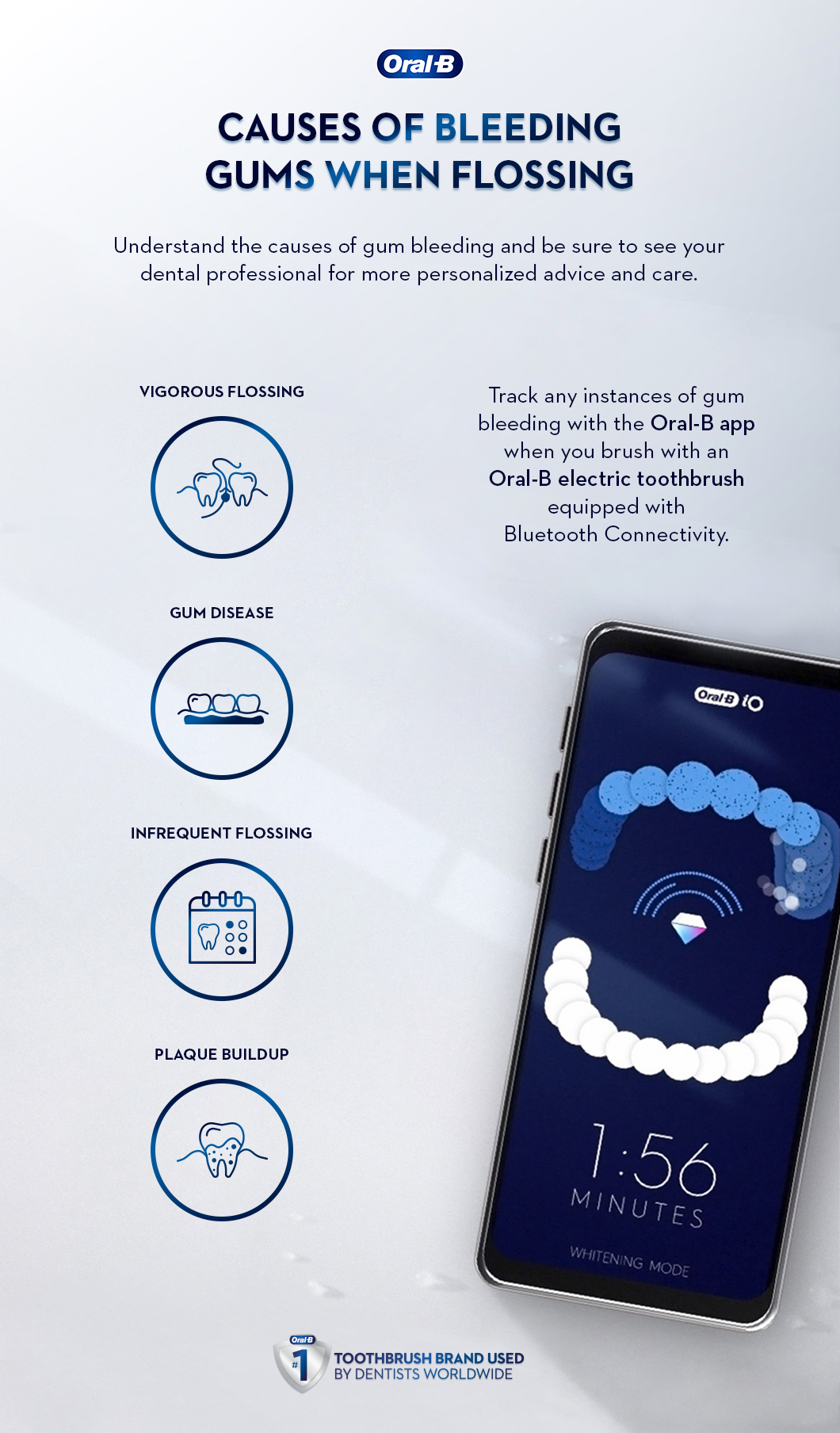WHY YOUR GUMS BLEED WHEN FLOSSING

- Causes of Bleeding Gums when Flossing
- Gentler Floss and Flossing Alternatives
- Sensitive Gums Oral Care
You may experience tender or bleeding gums when flossing or even brushing. One of the most common causes of bleeding gums when flossing is gum disease caused by plaque bacteria. Long term plaque bacterial growth can lead to gum issues and cavities. Flossing once a day and brushing twice daily with an electric toothbrush removes more bacterial plaque helping to prevent gum disease and cavities.
Causes of Bleeding Gums when Flossing
Gum bleeding is actually a more common instance than most people realize, and may not be a reason for concern, however there are instances of gum bleeding where visiting your dental professional may be best. Below are the common causes of bleeding gums when flossing:
- Infrequent Flossing: If you don’t floss at least once a day, then your gums may be more prone to bleeding when you do reach for the floss. Aim to brush after meals and floss at least once every day to limit your chances of gum bleeding.
- Vigorous Flossing: Flossing with too much pressure can cause some gum bleeding to occur. Try flossing gently in between teeth to help limit instance of bleeding gums.
Learn how to floss properly - Plaque Buildup: Plaque can build up along and below the gum line, especially when a thorough oral care routine is not practiced daily. The buildup can lead to bacteria, tartar buildup, and even gum disease which causes gums to bleed if not taken care of properly.
- Gum Disease: Gum or periodontal disease can cause gums to bleed. Symptoms can also include red or swollen gums and hypersensitivity when brushing or flossing. See your dental professional right away if you show any signs of gum disease.
- Pregnancy: Hormones can impact your oral health during pregnancy, and with high levels of progesterone, gums are more prone to developing gingivitis and bleeding gums.
- Brushing Too Hard: Brushing with too much pressure can leave gums vulnerable to damage and may cause bleeding. To help protect gums from overbrushing, several electric toothbrushes, like the Oral-B iO2 feature a pressure sensor so you’re always getting your perfect clean.
- Diet: What you eat can have effect on your gum health. Foods high in sugars and carbs can cause more plaque buildup to accumulate on teeth and gums, leaving them more susceptible to gum disease.

Gentler Floss and Flossing Alternatives
When it comes to keeping your gums in good condition, try brushing a minimum of twice a day and flossing at least once a day. To help remove more plaque from between teeth while staying gentle on fingers and gums, try Oral-B Glide Floss.
If your gums are sensitive to traditional floss consider using a water flosser. The Oral-B Water Flosser Advanced, Portable Oral Irrigator Handle featuring Oxyjet Technology features three unique modes: intense, medium, or sensitive so you can pick the water pressure that’s best for you.
Find out about other floss alternatives available.
Sensitive Gums Oral Care
If you’re more prone to sensitivity, try brushing with an electric toothbrush equipped with a sensitive mode. The Oral-B iO2 delivers an even gentler, perfect clean in just 1 touch with its Super Sensitive brushing mode, . Plus, it features a Smart Pressure Sensor to help protect gums from overbrushing.
First time electric toothbrush users may experience gum bleeding as they heal from gum disease. This should ease up after just a week.
From Oral-B the #1 brand used by dentists worldwide*.
*Based on surveys of a representative worldwide sample of dentists carried out for P&G regularly.
Sources:
https://granddentalgroup.com/why-do-my-gums-bleed-when-i-floss/#:~:text=In%20some%20cases%2C%20patients%20who,teeth%2C%20gum%2C%20and%20tongue.
https://www.medicalnewstoday.com/articles/324613


